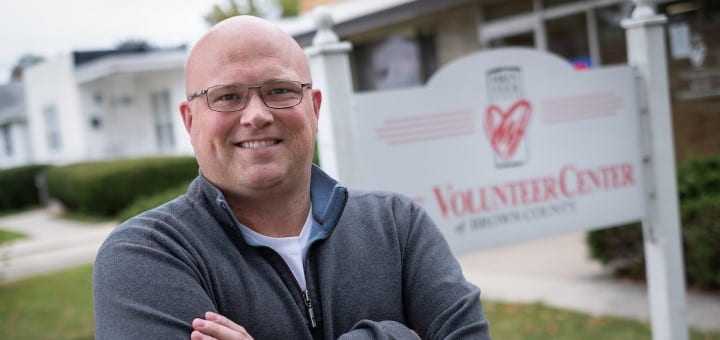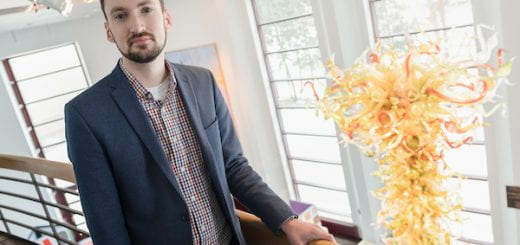Upgrading a nonprofit with knowledge

No money, no mission. It may surprise you to learn that the goal of most not-for-profits is to be profitable. The biggest difference between a for-profit and not-for-profit enterprise? Just follow the money. For-profit enterprises reward their investor, not-for-profits return all revenues to continue their mission.
In the case of Eric Sponholtz, Executive Director of The Volunteer Center of Brown County, his mission is to maintain and grow the center’s core service that connects people who want to donate their time and efforts with other organizations looking for volunteers. “We work with other organizations to help them find volunteers.”
Turns out there are quite a few nonprofits in Northeastern Wisconsin looking for more than a few generous souls.
“Over the course of a year, more than 100 organizations take advantage of our services“ says Sponholtz, “we have an affiliate partner base of about 70—including UW-Green Bay.”
No small task for a staff of five, including Sponholtz. And what if adding personnel isn’t an immediate option for an over-achieving nonprofit?
Then just add knowledge.
The Volunteer Center’s own daunting mission is now more achievable through Sponholtz’s participation in UW-Green Bay’s new Nonprofit Leadership Certificate Program. The program enables individuals passionate about their causes to attain and adapt the best practices of the most successful businesses (private, public, profit or nonprofit) in the region.
Sponholtz credits his experiences growing up in the small town of Berlin, Wisconsin, with imprinting the importance of one-on-one relationships and the importance of service, no matter the pursuit. “My dad was a professional photographer, and we lived above the studio.”
Plus, he learned early on that his talents lay in bringing out the best in others, even on the smallest scale. “My first job was coaching T-ball.” And not everyone would include that fact in their resumé—“It takes a special person to be able to do that for very long, but it was a lot of fun. And it set me up for what I was going to do professionally.”
When your profession is guiding and growing a small, very lean organization, every decision is big.
“From a Volunteer Center perspective, we have to really pick and choose what we undertake as far as professional development.” Plus it turns out learning locally has priceless benefits. “I was familiar with some of the presenters. I knew their style and what they brought to the table, so it just seemed like a good fit that way, too.”
With the program consisting of five manageable sections, it was easier to lean into areas of best practices that may not be a strong suit. “Anyone who knew me outside of the Volunteer Center, knew that I wasn’t a super-big numbers guy,” Sponholtz readily admits. “I was aware of budgets, I had worked with them in the past with other nonprofits, but budgets weren’t something I focused on. One of the main focuses of the program was on budgeting and accounting. I was able to take some of those strategies and practices back to The Volunteer Center.”
Beyond the numbers, his most personally profitable take-away went beyond the day-to-day functioning of a successful enterprise. “I think the big thing the certificate program taught us all was how to be better leaders, not just professionally, but personally too. How to listen to people. How to get to the root of a problem and put your best foot forward to solve that problem.”
Plus, in addition to a shiny new credential for his Linkedin profile, as a member of the first co-hort to complete the program, Sponholtz can also add the accolade of “early adopter” to his T-ball coaching expertise.
So, would he recommend the program to others? He already has. “They’ve just started the second cohort and a member of my staff is part of it.”
Q&A WITH ERIC
What’s keeping you up at night?
Fundraising. Corporate support. How we can continue to be viable and make an impact. There are so many other worthwhile causes and organizations, how we can continue to prove we are one of them?
What gets you out of bed in the morning?
My son. Nonprofit work is the best way for me to help him learn it’s good to be able to serve others. Also, that no two days are alike. Whether there are successes or challenges we need to face, I love the variety and the difference in what each day brings.
What’s the last lesson life taught you?
Don’t sweat the small stuff! Life is going to throw you curveballs, but it’s how you react and how you push through that defines you. You control what you can control.
How has education opened doors for you?
It’s been a wonderful foundation for me. Being able to have opportunities to further my thinking, whether it was my undergraduate work or professional opportunities, just helps to solidify the choice I made in my life’s work.
How has education leveled the playing field?
It’s all about how far you want to take it. Young professionals these days are faced with a different set of challenges than folks were 20 years ago, not only how they enter the workforce, but how long they stay with a job and how quickly they may leave for a new one. Education helps to set people up for success and make it so employers feel comfortable hiring people fresh out of college with the skills they need to grow their business.
What do you think is higher education’s biggest challenge?
Connecting opportunities to professional needs.
At UW-Green Bay, we believe that every person has the power to Rise. No matter who you are, where you’re from, or what you want to be. We invite you to read more Rise Stories about people from all walks of life who are blazing a brighter future for our region.









